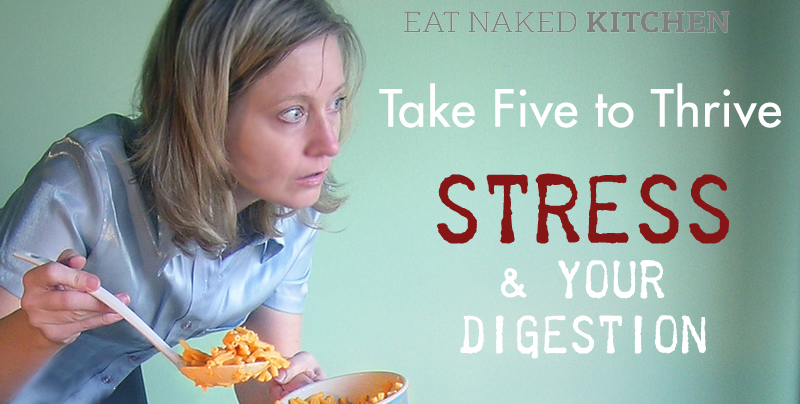It’s 7:45am and I’m running out the door, late, for an 8:00am appointment. I’m feeling frantic and I haven’t eaten. I have two choices: go hungry or grab something quickly and eat it in the car. What to do?
 Unfortunately, this scenario is the way many people play out their mornings, day after day. Somehow the endless list of to-do’s takes precedent over self-nourishment.
Unfortunately, this scenario is the way many people play out their mornings, day after day. Somehow the endless list of to-do’s takes precedent over self-nourishment.
If this describes your typical morning, keep reading. Eating on the run does more damage than leave your car dusted with escapist bits of breakfast.
Digestion is a process that’s controlled by your autonomic nervous system. This means you don’t have to consciously do anything to digest, much like you don’t have to try to breathe. It just happens. But, there’s a catch.
Your autonomic nervous system has two settings: stress state (sympathetic nervous system dominance, for you technical types) and relaxation state (parasympathetic nervous system dominance). Here’s the deal: you only digest when you’re in relaxation state.
So when you’re running around frantically looking for your car keys and scarfing down your morning smoothie, your body isn’t digesting that smoothie. It’s acting as smoothie storage until you’re next in relaxation state. Which, depending on the nature of your life, could be a while.
When you eat under stress and your food sits in your digestive tract without actually being digested, all sorts of unpleasant things happen:
• Instead of digesting at an appropriate rate, sugars ferment, fats go rancid, and proteins putrefy. These are the primary causes of bloating, belching, gas, and general digestive distress.
• Nutrient absorption is dramatically decreased while nutrient excretion is increased. This means you’re not getting the good stuff from your food.
• Oxygen supply decreases, which is bad news for your metabolism, since it relies on oxygen.
So, how to get out of stress and into relaxation while you eat? There are three key things you can do:
1) Breathe – taking three or four nice slow and deep breaths is the fastest way to bring your body from stress state to relaxation response. It also has the handy benefit of increasing the oxygen flow critical to metabolism and brings you into your body so you actually experience your meal.
2) Sit down – running around necessarily means your body isn’t relaxed. Sit down to eat, even if it’s for five minutes. You can have an expansive, relaxed five minutes for breakfast, or a frenetic and rushed five minutes. Give your body the benefit of those few minutes of relaxation.
3) Chew your food – food that hasn’t been properly chewed is that much harder to digest, and adds more stress on your body overall. An easy rule of thumb is to take one bite, then put your fork down, and don’t pick it up again for that next bite until you’ve completely chewed and swallowed the whole first bite. People who thoroughly chew their food typically end up eating less, digest their food better, and are more satiated after meals.
As I’m running out the door I realize I’m already late. Another five minutes while I sit to eat won’t hurt anyone, but rushing through my breakfast might.



